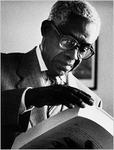Biography

Aimé Césaire was born June 25, 1913, in Basse-Pointe, a small town on the northeast coast of Martinique in the French Caribbean. He attended the Lycée Schoelcher in Martinique, and the Parisian schools Ecole Normale Supérieure and the Lycée Louis-le-Grand.
His books of poetry include Aimé Césaire: The Collected Poetry (University of California Press, 1983); Putting in Fetters (1960); Lost Bodies (1950), with illustrations by Pablo Picasso; Decapitated Sun (1948); Miraculous Arms (1946); and Notebook of a Return to the Homeland (1939).
He is also a playwright, and has written Moi, Laminaire (1982); The Tempest (1968), based on Shakespeare's play; A Season at Congo (1966); and The Tragedy of King Cristophe (1963).
About his work, Jean-Paul Sarte wrote: "A Césaire poem explodes and whirls about itself like a rocket, suns burst forth whirling and exloding like new suns—it perpetually surpasses itself."
He is also the author of Discourse on Colonialism (1950), a book of essays which has become a classic text of French political literature and helped establish the literary and ideological movement Negritude, a term Césaire defined as "the simple recognition of the fact that one is black, the acceptance of this fact and of our destiny as blacks, of our history and culture."
As a student he and his friend, Léopold Senghor of Sénégal created L'Etudiant noir, a publication that brought together students of Africa and the West Indies. Later, with his wife, Suzanne Roussi, Césaire co-founded Tropiques, a journal dedicated to American black poetry. Both journals were a stronghold for the ideas of Negritude.
Césaire is a recipient of the International Nâzim Hikmet Poetry Award, the second winner in its history. He served as Mayor of Fort-de-France as a member of the Communist Party, and later quit the party to establish his Martinique Independent Revolution Party. He was deeply involved in the struggle for French West Indian rights and served as the deputy to the French National Assembly. He retired from politics in 1993. Césaire died on April 17, 2008 in Martinique.
Poetry
* 1939: Cahier d'un retour au pays natal, Paris: Volontés
* 1946: Les armes miraculeuses, Paris: Gallimard
* 1947: Cahier d'un retour au pays natal, Paris: Bordas
* 1948: Soleil cou-coupé, Paris: K
* 1950: Corps perdu, Paris: Fragrance
* 1960: Ferrements, Paris: Editions du Seuil
* 1961: Cadastre, Paris: Editions du Seuil
* 1982: Moi, laminaire, Paris: Editions du Seuil
Theatre
* 1958: Et les Chiens se taisaient, tragédie: arrangement théâtral. Paris: Présence Africaine; reprint: 1997
* 1963: La Tragédie du roi Christophe. Paris: Présence Africaine; reprint: 1993; The tragedy of King Christophe, New York: Grove 1969
* 1969: Une Tempête, adapted from The Tempest by William Shakespeare: adaptation pour un théâtre nègre. Paris: Seuil; reprint: 1997; A Tempest, New York: Ubu repertory 1986
* 1966: Une Saison au Congo. Paris: Seuil; reprint: 2001; A season in the Congo, New York 1968, A play about Patrice Lumumba
Other writings
* Césaire, Aimé (January 1945), "Poésie et connaissance", Tropiques (12): 158–70 .
* Césaire, Aimé (1955), Discours sur le colonialisme, Paris: Présence Africaine,
* Césaire, Aimé (1957 [October 24, 1956]), Lettre à Maurice Thorez, Paris: Présence Africaine .[6]
* Césaire, Aimé (1960), Toussaint Louverture: La Révolution française et le problème colonial, Paris: Club français du livre
Last updated August 30, 2011



